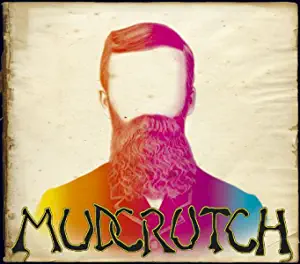Mudcrutch broke up fifty years ago. The Gainesville, Florida, band became local heroes by hosting a series of festivals at “Mudcrutch Farm”, which gained attention across the south. After Tom Petty left Gainesville for California, the group imploded in 1975.
Soon Benmont Tench and Mike Campbell called Gainesville natives—bassist Ron Blair and drummer Stan Lynch—to join their band that producer Denny Cordell called Tom Petty And The Heartbreakers. In August of 2007, Mudcrutch—Tom Petty, Mike Campbell, Benmont Tench, Randall Marsh and Tom Leadon recorded these songs in ten days. No headphones were used during the recording process.
Petty stated his intention with getting Mudcrutch back together: “I made a commitment at the beginning of the project that I wanted this to be Mudcrutch, done as it was back in the day. I really wanted it to be that band. I guess I started thinking that we left some music back there, and it was time to go and get it.”
“Shady Grove”, a bluegrass standard opens the CD with Petty and Leadon sharing vocal duties. Petty plays bass on this album—just like in the old days—while Leadon (left speaker) and Campbell (right speaker) handle all six-string work. This bluegrass number indicates Mudcrutch’s early intention, which was to play dyed-in-the-wool roots music. This version conjures up a psychedelic telecaster twang and a rhythmic Appalachian mojo…
Petty wrote seven of the fourteen tunes on this album. “Scare Easy” marks Petty’s first composition in the sequence. Mike Campbell’s side-winding electric playing compliments Petty’s classic-southern message in the indelible song: “I don’t scare easy/Don’t fall apart/When I’m under the gun/You can break my heart/I ain’t gonna run/I don’t scare easy/For no one.”
Another Petty tune, “Orphan of the Storm” rekindles some proverbial Texas desert skyline glory. Petty manipulates his drawl well enough not to seem hokey or insincere, and Campbell and Leadon’s guitars sound eight miles high. “Storm” operates where all resources of American music blend into one sound.
Dave Dudley’s “Six Days On the Road”—covered by Gram Parsons’ Flying Burrito Brothers, Taj Mahal and many others—proves an electric truck driving hoedown, Mudcrutch style. Petty’s laid back musical landscape on “Crystal River”—a nine-minute centerpiece song–flows like a quiet boat ride in the Crystal River National Wildlife Refuge under massive cypress trees.
“Oh Maria” evokes an old cowboy story, preserved in contemporary images filtered through a musical lens revealing…pink moons…cactus poems…old Mexico…bordellos…desert flowers…set to an acoustic backdrop with only Campbell’s haunting electric guitar shimmering in the background like some painful farewell.
Benmont Tench’s “This Is A Good Street” makes for interesting listening because he sings lead vocal on this song, which contains Sun Records magic in its almost-rockabilly short duration. “The Wrong Thing To Do”, another Petty tune, carries a sneering sort of lyric constructed upon a rollicking Stones quality augmented by Tench’s boogie-woogie piano.
Tom Leadon’s (brother of The Eagles/Flying Burrito Brothers’ Bernie) song, “Queen Of the Go-Go Girls” provides a fine glimpse into the glorious harmonizing between Petty and Leadon–in another country-flavored tune. The traditional “June Apple” allows Tench to exercise his telepathic music relationship with Campbell as this powerful instrumental evokes rural geography…nature’s haunting beauty into one cinematic Cajun jig that lifts off into interstellar space.
Mudcrutch renders Roger McGuinn’s “Lover of the Bayou” in a way that almost exceeds the potency of the original…which contained guitar work by none other than Clarence White. This is roadhouse music…where the floors are wooden…ceilings low…smoke hovers in the thick air…the gris-gris floats through the mist…feverish humidity…electric twangs slicing like rusty cans…blind midnight ravers…backwater secrets…dangerous mystery…hypnotic melody wedded by soundwave voodoo…kaleidoscope gumbo…and then the song disappears back into dark hinterlands…
Songs like Petty’s “Topanga Cowgirl” bring the ladies out to buy his records. Petty writes tunes that women like to sing because his female characters portray vivid images of mysterious dreamers, and the music causes them to dance. Petty always provided a higher-grade of rock and roll.
“Bootleg Flyer”, written by Petty and Campbell, emerges as a great outlaw song propelled by some of the best guitar work ever played by Mike Campbell–that can be said of this entire Mudcrutch album.
The final cut, “House of Stone” resembles an old Hank Williams song one might hear on the Grand Ole Opry. Sometimes it takes decades to deliver an absolute classic. Mudcrutch delivers…


